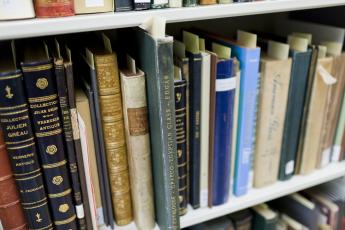Antiquarian Booksellers' Association of America Books Tell You Why, Inc.
How to Prevent Ghosting and Shadowing in Rare Books

By Joachim Koch
When it comes to rare books, condition is everything. Any kind of damage, discoloration, or flaws can significantly impact a book's value. One of the most common flaws we see in rare and antiquarian books is a condition called ghosting or shadowing. This condition occurs when a page fades unevenly, leaving a visible outline on the page.
Causes of Ghosting and Shadowing
One common culprit of ghosting is actually sunning, which occurs when the book is exposed to any light--not just sunlight. If you leave a book in a place where only part of it is exposed to light, the exposed part will fade and look visibly different from the unexposed parts. This process is a chemical reaction that accelerates deterioration of the book, resulting in brittle or delicate pages over time. Sunning may occur on a book's cover, or on pages that are left open and exposed. This is why museums often turn the pages of antiquarian books on display; even gentle "book safe" light can damage pages over time.
Another cause of ghosting is exposure to other paper or adhesives. For example, leaving a Post-it or bookmark in a book for long periods of time will leave an impression on the page; you'll be able to see the outline of where the Post-it or bookmark was after it was removed. Tape often leaves a similar trace. That's because most paper and adhesives are acidic, so they cause a chemical reaction in adjacent/treated leaves.
Preventing Ghosting and Shadowing
The reversal of ghosting and shadowing requires the intervention of a trained conservator and may not be cost effective for an individual volume in your collection. Thus it's critical for collectors to prevent this damage from occurring in the first place!
Antiquarian and rare books would ideally be stored in a dark place with no exposure to light - but that's not practical for any collector who actually wants to enjoy the collection. Instead, build your personal library in a room with small or no windows. Add UV filters to the windows if possible, and avoid using unshielded fluorescent bulbs in the areas where you store your books. You can also put archival dust jackets, which offer basic UV protection, on modern first editions. These measures will help prevent damage from sunning.
Meanwhile, be vigilant about the materials that come into contact with your rare books. Any paper used to protect a rare book should be archival quality and acid free. Do not use any tapes, glues, or other products on books unless they are specifically designed for that use. In general, the best course of action for repairing a book at home is ... to consult an expert first. Even products specifically intended for use on rare books can cause damage if applied incorrectly or overzealously, so you'll want to talk to a conservator before attempting repairs yourself.
You should also thoroughly check your books to ensure that there are no papers stored inside. Letters, documents, and bookmarks are frequent finds. If you do discover something tucked within the pages, don't just throw it away. Note the page where you found it and whether it was attached with anything (a paper clip, perhaps). Then place the item in an archival envelope or pouch and store it appropriately.
With the right care, you can protect your rare books from fading and discoloration caused by sunning and exposure to acidic materials. These steps help maintain the value of your rare and antiquarian book collection.
(Posted on Books Tell You Why. Presented here by permission of the author.)
